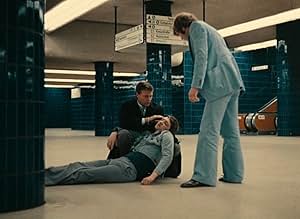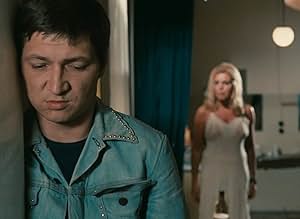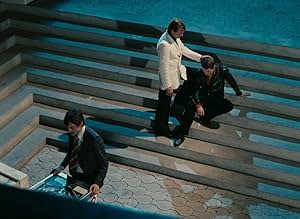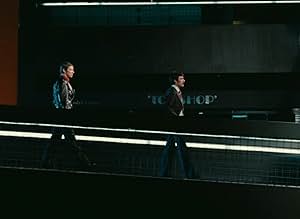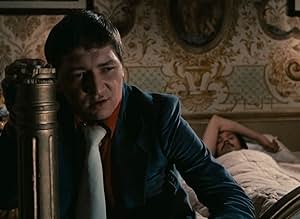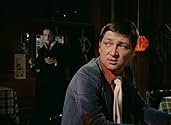Rainer Werner Fassbinder(1945-1982)
- Writer
- Director
- Actor
Above all, Rainer Werner Fassbinder was a rebel whose life and art was
marked by gross contradiction. Openly homosexual, he married twice; one
of his wives acted in his films and the other served as his editor.
Accused variously by detractors of being anticommunist, male
chauvinist, antiSemitic and even antigay, he completed 44
projects between 1966 and 1982, the majority of which can be
characterized as highly intelligent social melodramas. His prodigious
output was matched by a wild, self-destructive libertinage that earned
him a reputation as the enfant terrible of the New German Cinema (as
well as its central figure.) Known for his trademark leather jacket and
grungy appearance, Fassbinder cruised the bar scene by night, looking
for sex and drugs, yet he maintained a flawless work ethic by day.
Actors and actresses recount disturbing stories of his brutality toward
them, yet his pictures demonstrate his deep sensitivity to social
misfits and his hatred of institutionalized violence. Some find his
cinema needlessly controversial and avant-garde; others accuse him of
surrendering to the Hollywood ethos. It is best said that he drew forth
strong emotional reactions from all he encountered, both in his
personal and professional lives, and this provocative nature can be
experienced posthumously through reviewing his artistic legacy.
Fassbinder was born into a bourgeois Bavarian family in 1945. His father was a doctor and his mother a translator. In order to have time for her work, his mother frequently sent him the movies, a practice that gave birth to his obsession with the medium. Later in life, he would claim that he saw a film nearly every day and sometimes as many as three or four. At the age of 15, Fassbinder defiantly declared his homosexuality, soon after which he left school and took a job. He studied theater in the mid-sixties at the Fridl-Leonhard Studio in Munich and joined the Action Theater (aka, Anti-Theater) in 1967. Unlike the other major auteurs of the New German Cinema (e.g., Schlöndorff, Herzog and Wenders) who started out making movies, Fassbinder acquired an extensive stage background that is evident throughout his work. Additionally, he learned how to handle all phases of production, from writing and acting to direction and theater management. This versatility later surfaced in his films where, in addition to some of the aforementioned responsibilities, Fassbinder served as composer, production designer, cinematographer, producer and editor. [So boundless was his energy, in fact, that he appeared in 30 projects of other directors.] In his theater years, he also developed a repertory company that included his mother, two of his wives and various male and female lovers. Coupled with his ability to serve in nearly any crew capacity, this gave him the ability to produce his films quickly and on extremely low budgets.
Success was not immediate for Fassbinder. His first feature length film, a gangster movie called Love Is Colder Than Death (1969) was greeted by catcalls at the Berlin Film Festival. His next piece, Katzelmacher (1969), was a minor critical success, garnering five prizes after its debut at Mannheim. It featured Jorgos, an emigrant from Greece, who encounters violent xenophobic slackers in moving into an all-German neighborhood. This kind of social criticism, featuring alienated characters unable to escape the forces of oppression, is a constant throughout Fassbinder's diverse oeuvre. In subsequent years, he made such controversial films about human savagery such as Pioneers in Ingolstadt (1971) and Whity (1971) before scoring his first domestic commercial success with The Merchant of Four Seasons (1972). This moving portrait of a street vendor crushed by the betrayal and his own futility is considered a masterpiece, as is his first international success Fear Eats the Soul (1974) (Fear Eats the Soul). With a wider audience for his efforts, however, some critics contend that Fassbinder began to sell out with big budget projects such as Despair (1978), Lili Marleen (1981) and Lola (1981). In retrospect, however, it seems that the added fame simply enabled Fassbinder to explore various kinds of filmmaking, including such "private" works as In a Year of 13 Moons (1978) and The Third Generation (1979), two films about individual experience and feelings. His greatest success came with The Marriage of Maria Braun (1979) (The Marriage of Maria Braun), chronicling the rise and fall of a German woman in the wake of World War II. Other notable movies include The Bitter Tears of Petra von Kant (1972), Fox and His Friends (1975), Satan's Brew (1976) and Querelle (1982), all focused on gay and lesbian themes and frequently with a strongly pornographic edge.
His death is a perfect picture of the man and his legend. On the night of June 10, 1982, Fassbinder took an overdose of cocaine and sleeping pills. When he was found, the unfinished script for a version of Rosa Luxemburg was lying next to him. So boundless was his drive and creativity that, throughout his downward spiral and even in the moment of his death, Fassbinder never ceased to be productive.
Fassbinder was born into a bourgeois Bavarian family in 1945. His father was a doctor and his mother a translator. In order to have time for her work, his mother frequently sent him the movies, a practice that gave birth to his obsession with the medium. Later in life, he would claim that he saw a film nearly every day and sometimes as many as three or four. At the age of 15, Fassbinder defiantly declared his homosexuality, soon after which he left school and took a job. He studied theater in the mid-sixties at the Fridl-Leonhard Studio in Munich and joined the Action Theater (aka, Anti-Theater) in 1967. Unlike the other major auteurs of the New German Cinema (e.g., Schlöndorff, Herzog and Wenders) who started out making movies, Fassbinder acquired an extensive stage background that is evident throughout his work. Additionally, he learned how to handle all phases of production, from writing and acting to direction and theater management. This versatility later surfaced in his films where, in addition to some of the aforementioned responsibilities, Fassbinder served as composer, production designer, cinematographer, producer and editor. [So boundless was his energy, in fact, that he appeared in 30 projects of other directors.] In his theater years, he also developed a repertory company that included his mother, two of his wives and various male and female lovers. Coupled with his ability to serve in nearly any crew capacity, this gave him the ability to produce his films quickly and on extremely low budgets.
Success was not immediate for Fassbinder. His first feature length film, a gangster movie called Love Is Colder Than Death (1969) was greeted by catcalls at the Berlin Film Festival. His next piece, Katzelmacher (1969), was a minor critical success, garnering five prizes after its debut at Mannheim. It featured Jorgos, an emigrant from Greece, who encounters violent xenophobic slackers in moving into an all-German neighborhood. This kind of social criticism, featuring alienated characters unable to escape the forces of oppression, is a constant throughout Fassbinder's diverse oeuvre. In subsequent years, he made such controversial films about human savagery such as Pioneers in Ingolstadt (1971) and Whity (1971) before scoring his first domestic commercial success with The Merchant of Four Seasons (1972). This moving portrait of a street vendor crushed by the betrayal and his own futility is considered a masterpiece, as is his first international success Fear Eats the Soul (1974) (Fear Eats the Soul). With a wider audience for his efforts, however, some critics contend that Fassbinder began to sell out with big budget projects such as Despair (1978), Lili Marleen (1981) and Lola (1981). In retrospect, however, it seems that the added fame simply enabled Fassbinder to explore various kinds of filmmaking, including such "private" works as In a Year of 13 Moons (1978) and The Third Generation (1979), two films about individual experience and feelings. His greatest success came with The Marriage of Maria Braun (1979) (The Marriage of Maria Braun), chronicling the rise and fall of a German woman in the wake of World War II. Other notable movies include The Bitter Tears of Petra von Kant (1972), Fox and His Friends (1975), Satan's Brew (1976) and Querelle (1982), all focused on gay and lesbian themes and frequently with a strongly pornographic edge.
His death is a perfect picture of the man and his legend. On the night of June 10, 1982, Fassbinder took an overdose of cocaine and sleeping pills. When he was found, the unfinished script for a version of Rosa Luxemburg was lying next to him. So boundless was his drive and creativity that, throughout his downward spiral and even in the moment of his death, Fassbinder never ceased to be productive.


